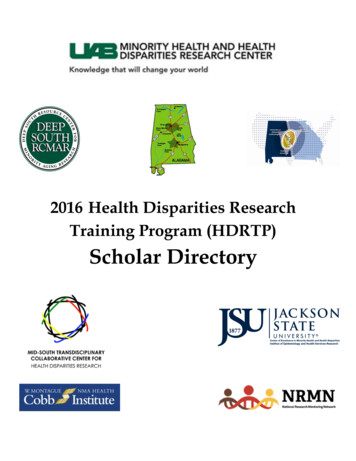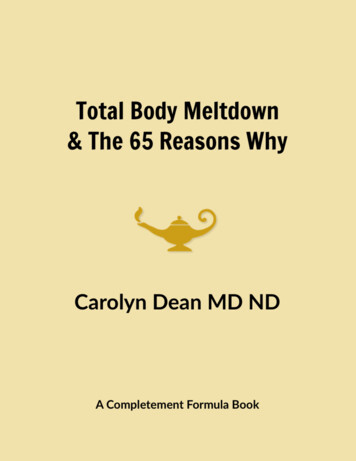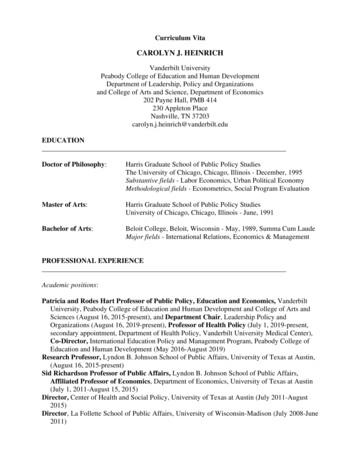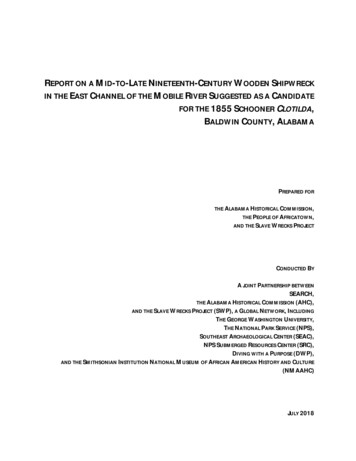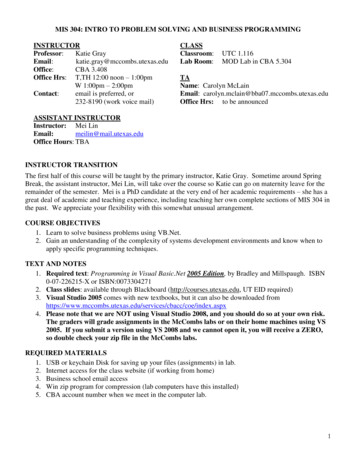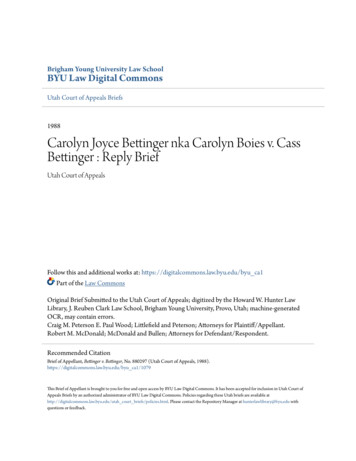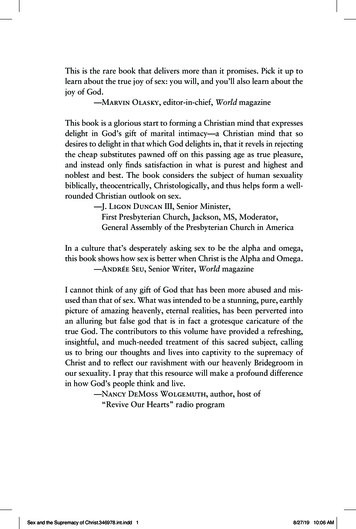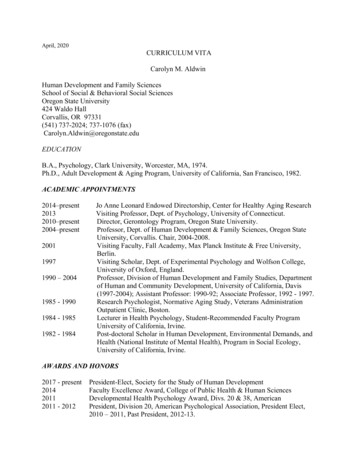
Transcription
April, 2020CURRICULUM VITACarolyn M. AldwinHuman Development and Family SciencesSchool of Social & Behavioral Social SciencesOregon State University424 Waldo HallCorvallis, OR 97331(541) 737-2024; 737-1076 (fax)Carolyn.Aldwin@oregonstate.eduEDUCATIONB.A., Psychology, Clark University, Worcester, MA, 1974.Ph.D., Adult Development & Aging Program, University of California, San Francisco, 1982.ACADEMIC �present200119971990 – 20041985 - 19901984 - 19851982 - 1984Jo Anne Leonard Endowed Directorship, Center for Healthy Aging ResearchVisiting Professor, Dept. of Psychology, University of Connecticut.Director, Gerontology Program, Oregon State University.Professor, Dept. of Human Development & Family Sciences, Oregon StateUniversity, Corvallis. Chair, 2004-2008.Visiting Faculty, Fall Academy, Max Planck Institute & Free University,Berlin.Visiting Scholar, Dept. of Experimental Psychology and Wolfson College,University of Oxford, England.Professor, Division of Human Development and Family Studies, Departmentof Human and Community Development, University of California, Davis(1997-2004); Assistant Professor: 1990-92; Associate Professor, 1992 - 1997.Research Psychologist, Normative Aging Study, Veterans AdministrationOutpatient Clinic, Boston.Lecturer in Health Psychology, Student-Recommended Faculty ProgramUniversity of California, Irvine.Post-doctoral Scholar in Human Development, Environmental Demands, andHealth (National Institute of Mental Health), Program in Social Ecology,University of California, Irvine.AWARDS AND HONORS2017 - present201420112011 - 2012President-Elect, Society for the Study of Human DevelopmentFaculty Excellence Award, College of Public Health & Human SciencesDevelopmental Health Psychology Award, Divs. 20 & 38, AmericanPresident, Division 20, American Psychological Association, President Elect,2010 – 2011, Past President, 2012-13.
Aldwin20022000 - 200219971989 - 199519841981 - 19821980 - 19821977 - 198019771972 - 19742Fellow, Gerontological Society of America.Elected At-Large Representative, Div. 20. Executive Committee, AmericanPsychological AssociationFellow, American Psychological Association, Divs. 20 & 38.FIRST Award, National Institute on AgingCareer Development Award, University of California, Irvine.Chancellor's Award for Excellence in Research, University ofCalifornia, San Francisco.Honor Society, University of California, Berkeley.Trainee Fellowship, National Institute on Aging.Regents Fellowship, University of California, San Francisco.Jonas T. Clark Scholarship, Clark University.GRANT FUNDINGOngoing ProjectsMind & Life Institute, Francis J. Varela Research Award02/05/2015 – 1/31/20202014-Varela-Proulx, Jeffrey; C. Aldwin, Faculty Research Mentor for J. ProulxIs Mindful Meditation Culturally Relevant for Native People?Purpose of this project is to determine how best to modify mindfulness meditation practices toaccommodate the Native American Experience.PendingNIH/NIA R01 (C. Aldwin, PI).04/01/2019 – 3/31/2023Self-Regulation and Optimal Aging, 2,089,958.Purpose is to examine (a) long-term patterns of coping, executive function, and inflammation;(b) relationships between those longitudinal patterns; (c) predictors and consequences of thosepatterns.NIH/NIA K07 (C. Aldwin, PI)09/01/2019 – 3/31/2024Stress, Resilience, and Healthy Aging 810,000Purpose is to develop an emphasis on stress, aging, and military veterans for the Center forHealthy Aging ResearchCompleted ProjectsOregon State University Research Office, Large Program Development Program (PI) 70,0006/01/17 – 5/31/19Long Term Effects of Military ServicePurpose of this grant is to conduct pilot studies pursuant to the development of an R01 on thelong-term effects of military service in veterans in Oregon.
Aldwin3NIH/NIA 1P01AG043362 (S. Hofer, PI)06/01/2013-05/31/2018Integrative analysis of longitudinal studies of agingProject combines multiple longitudinal studies of aging to examine relations among health,cognition, and personality over time and nation.Diversity supplement to NIH/NIA 3R01AG044917-02S1 for Dr. J. Small (T. Boerma, PI; C.Aldwin, subcontract PI). 257,63709/15/15 – 12/31/2017Direct and Indirect Impacts of HIV and ART among Older People in Community Settings.Purpose of project is to examine impact of HIV on trajectories of well-being on HIV caregivers and their care recipients in Uganda and South Africa.National Institute on Aging, R24 AG039343, “Lifespan Outcomes of Military Service,” 875,000, 9/30/10 – 6/30/17, Co-PI (A. Spiro III, PI). Purpose of this grant is to create a researchnetwork of individuals interested in the long-term effects of military service.National Institute on Aging, R01 AG032037, “Stress, Coping, Health and Optimal Aging,” 883,000, PI, 9/01/10 – 6/30/16. Purpose is to examine (a) long-term patterns of different typesof stress; (b) personality predictors and health consequences of those patterns; and (c) effect ofchronic stress on daily stress-reactivity.Diversity Supplement to R01 AG032037, for Jeffrey Proulx, 80,216, 7/01/11 – 6/30/16.National Science Foundation, 0965820-DGE, Integrative Graduate Education and ResearchTraineeship Program (IGERT): LIFE* in an Aging Society (Linking Individuals Families andEnvironments). ”Linking Individuals, Families and Environments in an Aging Society.” 2.87million, 7/1/10 – 6/30/16. Co-PI. (K. Hooker, PI). Purpose of this grant is to provide training tograduate students interested in aging and health.Templeton Foundation, “Religion/Spirituality and Congestive Heart Failure: PhysiologicalPathways of Health, 195,000. 3/2011 – 11/2013, Co-PI (C. Park, PI). Purpose of this grant isto determine whether physiological markers mediate the effect of religion/spirituality on thecourse of congestive heart failure.American Psychological Association, “Gerocentral.” Internal funding ( 10,000) for Divisions 20and 2 to develop a website for resources in clinical gerontology, 2012-2013.Center for Healthy Aging Research, OSU, “Multimodal Assessment of Stress, Health, andCognition,” 15,000, Co-PI (with S. Hofer, Co-PI).College of Health & Human Services, “Wisdom & Successful Aging,” 10,000. Coinvestigator, M. Levenson (PI), 2005-2006.UC Davis Hatch Funds, Cooperative Extension, Davis Longitudinal Study, 2001-2005.UC Davis Hatch Funds, Cooperative Extension, ‘Aging Californians in Urban and RuralSettings,” 2001-2002. Extended to 2004.Mental Insight Foundation, “Dissemination of the Results of the Evaluation of the HoffmanQuadrinity Conference”, 2003-2004. 10,000.Hoffman Institute, “Evaluation of the Quadrinity Process” (Co-Investigator), 1999-2001. 50,000.Donner Canadian Foundation, “Evaluation of the Quadrinity Process” (Co-Investigator), 20012002, 35,000.
Aldwin4UC Davis Hatch Funds, Cooperative Extension, “Development of Chronic Illness in Midlife,”2001, 10,000.UC Davis Hatch Funds, Cooperative Extension. "Childhood Trauma and Adaptation inAdulthood", 1996-2001 (variable).National Institute on Aging. "Mental and Physical Health Trajectories in Adulthood" (AG13006,Principal Investigator). 1996-1999, 110,000.National Institute on Alcoholism and Alcohol Abuse. "Aging and Alcohol Abuse." (CoInvestigator). 1992-97, 450,000.Dept. of Veterans Affairs, "Combat Exposure and Physical Health in Older Veterans." (CoInvestigator). 1995-1997, 300,000.National Institute on Aging, FIRST Award, R29-07465. "Psychosocial Factors Affecting Healthamong Older Men" (Principal Investigator). 1989 - 1994; extended to 1995, 350,000.Hatch Funds, United States Department of Agriculture. "Predictors and Consequences of theDevelopment of Self-Efficacy in Adulthood" (Principal Investigator). 1991-1995, variable.Murray Center Midlife Research Program, Radcliffe, & MacArthur Foundation. "Mid-life SexRole Identity as a Function of Work and Family Roles (Principal Investigator). 1991-1992(extended, 1992-1993), 3,000.US-Mexus fund, "Nutrition, Health, and Service Utilization of Elderly Hispanics." (CoInvestigator). 1992-93, 10,000.Veterans Administration Merit Review, "Effects of Combat Exposure on Well-being in LateLife" (Principal Investigator). 1989 - 1992, 175,000.National Institute on Aging. "Retirement and Physical Health in Older Men" (Co-PrincipalInvestigator). 1988 - 1991.Veterans Administration Medical Services Research Grant, "Social Support and Health amongOlder Men" (Co-Principal Investigator).Center for Metropolitan Studies, Department of Health and Human Services, "The Effects of aDeclining Economy on Health" (Co-Principal Investigator), 1983, 2,000.Society for the Psychological Study of Social Issues, Grants-in-Aid, "The Effects of a DecliningEconomy on Health" (Co-Principal Investigator), 1983. 1,500.PROFESSIONAL ASSOCIATIONS & ACTIVITIESAmerican Psychological Association, Fellow, Divisions 38 (Health Psychology) and 20(Adult Development & Aging). Div. 38 Committee on Aging and Health, member, 1993 –present; Fellows Committee, 2004 – 2005. Div. 20 Representative to BAPPI Committee onOlder Women and Health, 1995. At-Large Representative, Div. 20 (2000-2002), AwardsCommittee, 1999-2002 (Chair, 2000-2002), Program Co-Chair, 2005-2006, ProgramCommittee, 2006-2007) President Elect, 2010, President, 2011-12, Past-president, 2012-13.Gerontological Society of America, Fellow (2002); member, Awards Committee, 2012; chair,2013; past chair, 2014. Fellows committee, 2014-2017; chair, 2015-2016; past-chair 20162017.Society for the Study of Human Development, Steering Committee, 2005 – present; presidentelect, 2017 - presentEditor, Research in Human Development, 2009 – 2015.Co-Editor, Psychology and Health, 2001-2005.
Aldwin5Editorial Board, Journals of Gerontology: Psychological Sciences, 2000-2003.Editorial Board, Psychology & Aging, 2003 - 2004.Associate Editor, Journal of Personality & Social Psychology, 1995-1996. Consulting editor:1992-1994.Reviewer, J. Pers. Assessment, Health Psychology, Psych. & Aging, Amer. J. Comm. Psych.J. Gerontol., J. Stress & Anxiety, Developmental Psychology, Psychological Bulletin,International Journal of Human Development, Journal of Pers. & Soc. Psych., GuilfordPress, etc.Study Section Reviewer, NIH, Motivations, Emotions, Stress, & Health, 2011 – 2015; NIH Div.of Research Grants: NIA ad hoc program project reviewer (2015); Addressing Needs ofInformal Caregivers of Individuals with Alzheimer's Disease in the Context ofSociodemographic Factors (2012); Risk Behavior & Health Prevention (RBHP) 2011;Motivations ,Emotions, Stress & Health (MESH), 2006, 2010; Minority ResearchInfrastructure Support Program (MRISP), 2000; Behavioral Medicine, 1994. Also reviewgrants on an ad hoc basis for the Council of Medical Research, Great Britain, the NewZealand Council of Medical Research, the Canadian Council of Medical Research, theAustrian Research Foundation, the General Research Council, Hong Kong, and the IsraelScience Foundation.Consultant, White House Conference on Aging, 1995.Consultant, California Commission on Aging, 1995.PUBLICATIONSBooksAldwin, C. M. (1994). Stress, coping, and development: An integrative perspective. New York:Guilford. Second printing, 1995; paperback edition 1999. Forward by R. S. Lazarus).Aldwin, C. M. (2007). Stress, coping, and development: An integrative approach (2nd ed.). NewYork: Guilford. Forward by E. E. Werner. Translated into Korean by Sungrok Kang, JaewonYang, Hyunkyung Yoo, & Yu-Jin Jeong, Sigma Press (2015).Aldwin, C. M., & Gilmer, D. F. (2004). Health, illness, and optimal aging: Biological andpsychosocial perspectives. Thousand Oaks: Sage. Forward by J. Birren.Aldwin, C. M., & Gilmer, D. F. (2013). Health, illness, and optimal aging: Biological andpsychosocial perspectives, 2nd ed. New York: Springer. Forward by J. Birren. ISBN: 978-08261-9346-9.Aldwin, C. M., Igarashi, H., Gilmer, D. F., & Levenson, M.R. (2018). Health, illness, andoptimal aging: Biological and psychosocial perspectives, 3rd ed. New York: Springer.Aldwin, C. M., Park, C. L., & Spiro, A. III (Eds., 2007). Handbook of the Health Psychology &Aging. New York: Guilford. Forward by R. Abeles.Friedman, H. (Editor-in-Chief), K. A. Razak, A. M. Albano, C. M. Aldwin, K. Fingerman, C. D.Goodhart, J. M. Hooley, B. Litz, M. Lobel, C. Markey, M. Mechanic, R. Riggio, L.Temoshok, & T. Yates (Co-Editors), (2015). Encyclopedia of Mental Health, 2nd ed., NewYork: Elsevier.Spiro, A. III, Settersten, R. A., & Aldwin, C. M. (Editors) (2018). Long-term effects of militaryservice: The health and well-being of aging veterans. Washington, DC: AmericanPsychological Association Press.
Aldwin6Journal ArticlesCoyne, J., Aldwin, C., & Lazarus, R. (1981). Depression and coping in stressful episodes.Journal of Abnormal Psychology, 90, 439-447. DOI: 10.1037/0021-843X.90.5.439Colby, B., Aldwin, C., Price, L., Stegemann, C., Mishra, S. (1985). Adaptive potential, stress,and illness in the elderly. Medical Anthropology, 9, 283-295.Aldwin, C., & Revenson, T. (1986). Vulnerability to economic stress. American Journal ofCommunity Psychology, 14, 161-175. DOI: 10.1007/BF00911819Aldwin, C., & Greenberger, E. (1987). Cultural differences in the predictors of depression.American Journal of Community Psychology, 15, 789-813. DOI: 10.1007/BF00919803Aldwin, C., & Revenson, T. (1987). Does coping help? A re-examination of the relationbetween coping and mental health. Journal of Personality and Social Psychology, 53, 337348. DOI: 10.1007/BF00911819Bossé, R., Aldwin, C., Levenson, M.R., & Ekerdt, D. (1987). Mental health differences amongretirees and workers: Findings from the Normative Aging Study. Psychology and Aging, 2,383-389. DOI: 10.1037/0882-7974.2.4.383Aldwin, C., & Stokols, D. (1988). The effects of environmental change on individuals andgroups: Some neglected issues in stress research. Journal of Environmental Psychology, 8,57-75. DOI: 10.1016/S0272-4944(88)80023-9Clark, G., Hall, N., Aldwin, C., Harris, J., Borkan, G., & Srinivasan, M. (1988). Measures ofpoor early growth are correlated with lower adult levels of thymosin-alpha 1: results from theNormative Aging Study. Human Biology, 60, 435-451. DOI:Levenson, M.R., Aldwin, C., Bossé, R., & Spiro, A. III (1988). Emotionality and mental health:Longitudinal findings from the Normative Aging Study. Journal of Abnormal Psychology,97, 94-96. DOI: 10.1037/0021-843X.97.1.94Aldwin, C., Levenson, M.R., Spiro, A. III, & Bossé, R. (1989). Does emotionality predictstress? Findings from the Normative Aging Study. Journal of Personality and SocialPsychology, 56, 618-624. DOI: 10.1037/0022-3514.56.4.618Aldwin, C., Spiro, A. III, Levenson, M.R., & Bossé, R. (1989). Longitudinal findings from theNormative Aging Study. I. Does mental health change with age? Psychology and Aging, 4,295-306. DOI: 10.1037/0882-7974.4.3.295Clark, G. A., Aldwin, C. M., Hall, N. R., Spiro, A. III, & Goldstein, A. (1989). Is poor earlygrowth related to adult immune aging? A follow-up study. American Journal of HumanBiology, 1, 331-337. DOI: 10.1002/ajhb.1310010313Bossé, R., Aldwin, C., Levenson, M.R., Workman-Daniels, K., & Ekerdt, D. (1990).Differences in social support among retirees and workers: Findings from the NormativeAging Study. Psychology and Aging, 5, 41-47. DOI: 10.1037/0882-7974.5.1.41Kennedy, B., Aldwin, C., Douglas, C., Bossé, R., & Chauncey, H. (1990). Personality anddental care utilization: finding from the VA longitudinal study. Special Care in Dentistry,10, 102-6. DOI:Levenson, M., Aldwin, C., Butcher, J., de Labry, L., Workman-Daniels, K., & Bossé, R. (1990).The MAC Scale in a normal population: The meaning of "false positives." Journal of Studieson Alcohol, 51, 457-462. DOI: 1998-12985-010Spiro, A. III, Aldwin, C., Levenson, M.R., & Bossé, R. (1990). Longitudinal findings from theNormative Aging Study. II. Do emotionality and extraversion predict symptom change?Journals of Gerontology: Psychological Sciences, 45, 136-144. DOI:
Aldwin710.1093/geronj/45.4.P136Bossé, R., Aldwin, C., Levenson, M.R., & Workman-Daniels, K. (1991). How stressful isretirement? Findings from the Normative Aging Study. Journals of Gerontology:Psychological Sciences, 46, P9-P14. DOI: 10.1093/geronj/46.1.P9Aldwin, C. (1991). Does age affect the stress and coping process? Implications of agedifferences in perceived locus of control. Journal of Gerontology: Psychological Sciences,46, P174-180. DOI: 10.1093/geronj/46.4.P174Aldwin, C., Spiro, A. III, Clark, G., & Hall, N. (1991). Thymic peptides, stress and depressivesymptoms in older men: A comparison of different statistical techniques for small samples.Brain, Behavior and Immunity, 5, 206-218. DOI: 10.1016/0889-1591(91)90017-5Butcher, J. N., Aldwin, C., Levenson, M. R., Ben-Porath, Y. S., Spiro, A. III, & Bossé, R.(1991). Personality and aging: A study of the MMPI-2 among older men. Psychology andAging, 6, 361-370. DOI: 10.1037/0882-7974.6.3.361Jones, K. J., Albert, M. S., Duffy, F. H., Hyde, M. R., Naeser, M., & Aldwin, C. (1991).Modeling age using cognitive, psychosocial, and physiological variables. ExperimentalAging Research, 17, 227-242. DOI: 10.1080/03610739108253900Mishra, S. I., Aldwin, C. M., Colby, B. N, & Oseas, R. S. (1991). Adaptive potential, stress, andnatural killer cell activity in older adults. Journal of Aging and Health, 3, 368-385. DOI:10.1177/089826439100300304Bossé, R., Aldwin, C. M., Levenson, M. R., Spiro, A. III, & Mroczek, D. K. (1993). Change insocial support after retirement: Longitudinal findings from the Normative Aging Study.Journals of Gerontology: Psychological Sciences, 48, 210-217. DOI:10.1093/geronj/48.4.P210Mroczek, D. K., Spiro, A. III, Aldwin, C. M., Ozer, D. J., & Bossé, R. (1993). Constructvalidation of optimism and pessimism in older men: Findings from the Normative AgingStudy. Health Psychology, 12, 406-409. DOI: 10.1037/0278-6133.12.5.406Aldwin, C. M., Levenson, M. R., & Spiro, A. III. (1994). Vulnerability and resilience to combatexposure: Can stress have lifelong effects? Psychology and Aging, 9, 34-44.Reprinted in In M.D. Matthews & J.H. Laurence (Eds.), Military psychology, Vol. 3. ThousandOaks CA: SAGE Publications. DOI: 10.1037/0882-7974.9.1.34Spiro, A. III, Schnurr, P., & Aldwin, C. M. (1994). Combat-related PTSD in older men.Psychology and Aging, 9, 17-26. DOI: 10.1037/0882-7974.9.1.17Go, C., Brustrom, J. E., Lynch, M., & Aldwin, C. M. (1995). Ethnic trends in survival curvesand mortality. The Gerontologist, 35, 318-326.Spiro, A. III, Aldwin, C. M., Ward, K. D., & Mroczek, D. K. (1995). Personality and theincidence of hypertension among older men: Longitudinal findings from the NormativeAging Study. Health Psychology, 14, 563-569. DOI: 10.1037/0278-6133.14.6.563Aldwin, C. M., Sutton, K. J., Chiara, G., & Spiro, A. III (1996). Age differences in stress,coping, and appraisal: Findings from the Normative Aging Study. Journals of Gerontology:Psychological Sciences, 51, 179-188. DOI: 10.1093/geronb/51B.4.P1796Aldwin, C. M., Sutton, K., & Lachman, M. (1996). The development of coping resources inadulthood. Journal of Personality, 64, 837-871. DOI: 10.1111/j.1467-6494.1996.tb00946.xSpiro, A. III, Schnurr, P. P., & Aldwin, C. M. (1997). A life-span perspective on the effects ofmilitary services. Journal of Geriatric Psychiatry, 30, 91-128.Levenson, M. R., Aldwin, Carolyn M., & Spiro, A. III. (1998). Age, cohort and period effectson alcohol consumption and problem drinking: Findings from the Normative Aging Study.
Aldwin8Journal of Studies on Alcohol, 59, 712-722.Schnurr, P., Spiro, A. III, Aldwin, C. M., & Stukel, T. A. (1998). Physical symptom trajectoriesfollowing trauma exposure: Longitudinal findings from the Normative Aging Study. Journalof Nervous and Mental Disorders, 186, 522-528. DOI: 10.1097/00005053-199809000-00002Niaura, R., Banks, S. M., Ward, K. D., Stoney, C. M., Spiro, A. III, Aldwin, C. M., Landsberg,M.D., & Weiss, S. T. (2000). Hostility and the metabolic syndrome in older males: TheNormative Aging Study. Psychosomatic Medicine, 62, 7-16. Reprinted in Foundations inSocial Neuroscience, J. T. Cacioppo, G. G. Bertson, R. Adolphs, C. Sue Carter, R. J.Davidson, M. K. McClinock, B. S. McEwen, M. M. Meaney, D. L. Schacter, E. M.Sternberg, S. S. Suomi, & S. E. Taylor (Eds.), Cambridge, MA: The MIT Press, 2002, pp.1209-1224.Aldwin, C.M., Spiro, A. III, Levenson, M. R., & Cupertino, A. P. (2001). Longitudinalfindings from the Normative Aging Study. III. Personality, individual health trajectories, andmortality. Psychology and Aging, 16, 450-465. DOI: 10.1037/0882-7974.16.3.450DuPurtuis, L., Aldwin, C. M., & Bosse’, R. (2001). Does the source of support matter fordifferent health outcomes? Findings from the Normative Aging Study. Journal of Healthand Aging, 13, 494-510. DOI: 10.1177/089826430101300403Gilmer, D. F., & Aldwin, C. M. (2002). Trajectories of health and social support in frail youngold and old-old patients after hospitalization. Journal of the Aging Family System, 2, 1-14.Niaura, R. S., Stroud, L., R. Todaro, J., Ward, K. D., Spiro, A. III, Aldwin, C. M., LewisLandsberg, L. & Weiss, S. T. (2003). Associations between repression, generalmaladjustment, body weight, and body shape in older males: The Normative Aging Study.International Journal of Behavioral Medicine, 10, 221-238. DOI:10.1207/S15327558IJBM1003 03Aldwin, C. M., & Levenson, M. R. (2004). Post-traumatic growth: A developmentalperspective. Psychological Inquiry, 15, 19-22. DOI: 10.1207/s15327965pli1501 02Aldwin, C. M., & Park, C. L. (2004). Coping and physical health: An overview. Psychologyand Health: Special Issue, Coping and Physical Health, 19, 277-281. DOI:10.1080/0887044042000193514Levenson, M. R., Jennings, P. A., Aldwin, C. M., & Shiraishi, R. W. (2005). Selftranscendence: Conceptualization and measurement. International Journal of Aging &Human Development, 60, 127-143. DOI: 10.2190/XRXM-FYRA-7U0X-GRC0Jennings, P. A., Aldwin, C. M., Levenson, M. R., Spiro, A. III, & Mroczek, D. (2006). Combatexposure, perceived benefits of military service, and wisdom in later life: Findings from theNormative Aging Study. Research on Aging, 28, 115-134. DOI: 10.1177/0164027505281549Cupertino, A., Aldwin, C. M., & Oliveira, B. H. D. (2006). Moderadores dos efeitos doestresse na saúde auto-percebida de cuidadores (Moderators of the stress effects oncaregiver's self-perceived health). Interação em Psicologia, 10, 9-18. on, M. R., Aldwin, C. M., & Yancura, L. A. (2006). Positive emotional change:Mediating effects of forgiveness and spirituality. Explore: The Journal of Science andHealing, 2, 498-508.Yancura, L. A., Aldwin, C. M., Levenson, M. R., & Spiro, A. III. (2006). Coping, affect, andthe metabolic syndrome in older men: How does coping get under the skin? Journals ofGerontology: Psychological Sciences, 61, 295-303. doi: 10.1093/geronb/61.5.P295Yancura, L., & Aldwin, C. M. (2008). Coping and health in older adults. Current Psychiatry
Aldwin9Reports, 10, 5-10.Park, C. L., Aldwin, C. M., Fenster, J., & Snyder, L. (2008). Pathways to post-traumatic growthversus post-traumatic stress: Exposure, coping and emotional reactions following theSeptember 11, 2001, terrorist attacks. American Journal of Orthopsychiatry, 78, 300-312.DOI: 10.1037/a0014054Boeninger, D. K., Shiraishi, R. W., Aldwin, C. M. & Spiro, A. III. (2009). Why do older menreport low stress ratings? Findings from the Veterans Affairs Normative Aging Study.International Journal of Aging & Human Development, 68(2), 149-170. doi:10.2190/AG.68.2.cAldwin, C. M. (2009). Gender and wisdom: A brief overview. Research in HumanDevelopment, 6, 1-8. doi: 10.1080/15427600902779347Yancura, L. A. & Aldwin, C. M. (2009). Stability and change in retrospective reports ofchildhood experiences over a 5-year period: Findings from the Davis Longitudinal Study.Psychology and Aging, 24, 715-721. doi: 10.1037/a0016203Aldwin, C. M., Cunningham, M., & Taylor, A. L. (2010). Resilience across the life span: Atribute to Emmy E. Werner, Research in Human Development, 7:3, 159-163, doi:10.1080/15427609.2010.504502Aldwin, C. M., & Yancura, L. A. (2010). Effects of stress on health and aging: Two paradoxes.California Agriculture, 64, 183-188. DOI: 10.3733/ca.v064n04p183Aldwin, C. M., Molitor, N-.T., Spiro, A. III, Levenson, M. R., Molitor, J., & Igarashi, H.(2011). Do stress trajectories predict mortality in older men? Longitudinal findings from theVA Normative Aging Study. Journal of Aging Research. Volume 2011 (2011), ArticleID 896109, 10 pages. doi: 10.4061/2011/896109Aldwin, C. M., & Igarashi, H. (2012). An ecological model of resilience in late life. AnnualReview of Gerontology/Geriatrics, 32, 115-130. doi: http://dx.doi.org/10.1891/01988794.32.115Aldwin, C. M. (2014). Rethinking developmental science. Research in Human Development,11(4), 247-254. doi: 10.1080/15427609.2014.967045Aldwin, C. M., Jeong, Y.-J., Igarashi, H., & Spiro, A. III. (2014). Do hassles and uplifts changewith age? Longitudinal findings from the VA Normative Aging Study. Psychology andAging, 29, 57-71. DOI: 10.1037/a0035042Aldwin, C. M., Jeong, Y.-J., Igarashi, H., Choun, S., & Spiro, A. III (2014). Do hassles mediatebetween life events and mortality in older men? Longitudinal findings from the VANormative Aging Study. Journal of Experimental Gerontology, 59, 74–80. DOI:10.1016/j.exger.2014.06.019Aldwin, C. M., Park, C. L., Jeong, Y.-J., & Nath, R. (2014). Differing pathways betweenreligiousness, spirituality, and health: A self-regulation perspective. Psychology of Religionand Spirituality, 6, 9-21. DOI: 10.1037/a0034416Buz, J., Sanchez, M., Levenson, M. R., & Aldwin, C. M. (2014). Aging and social networks inSpain: The importance of pubs and churches. International Journal of Aging & HumanDevelopment, 78, 23-47. DOI: 10.2190/AG.78.1.cLee, S., Choun, S., Levenson, M. R., & Aldwin, C. M. (2015). Cross-cultural comparison ofself-transcendent wisdom between the United States and Korea. Journal of Cross-CulturalGerontology, 30, 143-161. DOI: 10.1007/s10823-015-9259-8.Nath, R., Jeong, Y.-K., Igarashi, H., Proulx, J., Aldwin, C. M., & Spiro, A. III (2015).Cholesterol and depressive symptoms in older men across time. Health Psychology Open, 2.
Aldwin10Doi: rch/results?fulltext aldwin&x 0&y 0&submit yes&journal set sphpo&src selected&andorexactfulltext andAldwin, C. (2015). How can developmental systems theories cope with free will? Theimportance of stress-related growth and mindfulness. Research in Human Development,12(3-4), 189-195. Doi: 10.1080/15427609.2015.1068042Reprinted in, R. A. Settersten & M. McClelland (Eds.), The Study of Human Development:The Future of the Field.” New York: Taylor & Francis. (2018).Aldwin, C. M., Igarashi, H. A., & Levenson, M. R. (2016). Adversity and transformation: A pathto wisdom? International Journal of Psychology, 51, 893.Kang, S., Aldwin, C., Choun, S., & Spiro, A. III (2016). A lifespan perspective on combatexposure and PTSD symptoms in later life: Findings from the VA Normative Aging Study.The Gerontologist, 56(1), 22-32. doi: 10.1093/geront/gnv120Spiro, A. III, Settersten, R. A., & Aldwin, C. M. (2016). Long-term outcomes of militaryservice: A positive re-envisioning of its place in aging and the life course. TheGerontologist. 56(1): 5-13. doi: 10.1093/geront/gnv093Lee, L. O., Aldwin, C. M., Kubzanksy, L. D., Chen, E., Mroczek, D. K., Wang, J., & Spiro, A.III (2015). Do cherished children age successfully? Findings from the Normative AgingStudy. Psychology and Aging, 30, 894-910.Jeong, Y.-J., Aldwin, C. M., Igarashi, H., & A Spiro III (2016). Do hassles and upliftstrajectories predict mortality? Longitudinal findings from the VA Normative Aging Study.Journal of Behavioral Medicine, 39, 408-419. DOI: 10.1007/s10865-015-9703-9Park, C. L., Aldwin, C. M., Choun, S., Login, G., Suresh, D. P. & Bliss, D. (2016). Spiritualpeace and mortality in congestive heart failure patients. Health Psychology, 35(3), 203–210.DOI: 10.1037/hea0000271Lee, H., Choun, S., Aldwin, C., & Spiro, A. (2017). Long-term effects of combat exposure onwell-being in later life: The VA Normative Aging Study. Psychological Trauma: Theory,Research, Practice, and Policy, 9(6), 672-678. http://dx.doi.org/10.1037/tra0000282.Proulx, J., Croff, R., Oken, B., Aldwin, C. M., Fleming, C., Bergen-Cico, D., Le, T., & Noorani,M. (2017). Considerations for research and development of culturally relevant mindfulnessinterventions in native and African American communities. Mindfulness, 1-10.10.1007/s12671-017-0785-zSmall, J., Aldwin, C. M., Kowal, P., & Chatterji, S. (2017). Aging and HIV-related caregivingin sub-Saharan Africa: A social ecological approach. The Gerontologist.doi:10.1093/geront/gnx159Igarashi, H., Levenson, M. R., & Aldwin, C. M. (2018). The development of wisdom: A socialecological approach. Journals of Gerontology: Psychological Science: Series B, 73(8),1350–1358, https://doi.org/10.1093/geronb/gby002Lee, H., Aldwin, C. M., Choun, S., & Spiro, A. III (2019). Impact of combat exposure on mentalhealth trajectories in later life: Longitudinal Findings from the VA Normative Aging Study,Psychology and Aging, 34(4), 467-474Lee, L.O., Aldwin, C.M., Kubzansky, L.D., Mroczek, D.K., & Spiro, A. (2019). The long arm ofchildhood experiences on longevity: Testing midlife vulnerability and resilience pathways.Psychology and Aging, 34(7), 884–899. doi.org/10.1037/pag0000394Lee, H., Aldwin, C. M., Kang, S., & Ku, X. (2020). Do different types of war stressors haveindependent relations with mental health? Findings from the Korean Vietnam Veterans
Aldwin11Study. Psychological Trauma: Theory, Research, Practice, and Policy.doi.org/10.1037/tra0000557Aldwin, C. M., Igarashi, H., & Levenson, M. R. (in press). Only half the story. PsychologicalInquiry.Almeida, D. M., Charles, S. T., Mogle, J., Drewelies, J., Aldwin, C. M., Spiro, A. III, &Gerstorf, D. (in press). Chart
(1997-2004); Assistant Professor: 1990-92; Associate Professor, 1992 - 1997. 1985 - 1990 Research Psychologist, Normative Aging Study, Veterans Administration Outpatient Clinic, Boston. 1984 - 1985 Lecturer in Health Psychology, Student-Recommended Faculty Program University of California, Irvine.
